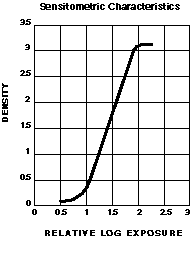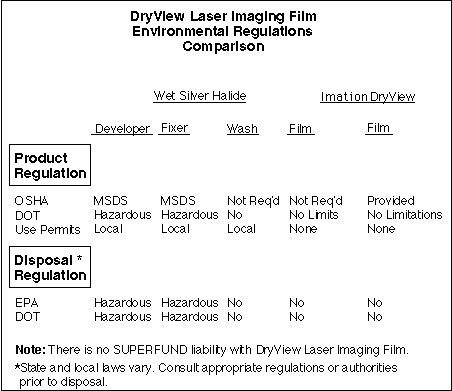



|

|

|
|
|
Go To | DryView Laser Imaging |
DryView Laser Imaging Film |
Product Data
Description 3M™ DryView™ Laser Imaging Film from Imation™ is a high-resolution, infrared-sensitive, photothermographic film designed specifically for the new family of Imation™ DryView™ Laser Imaging Systems. This new film delivers the same diagnostic image quality you get with your current silver halide laser films -- but it requires no "wet" chemistry, no "wet" film processors and no darkroom procedures. Which means there's no need for special plumbing, wet chemistry disposal procedures or modifications to your facility. This new film is packaged in daylight load packages and is available in 14" x 17" and 8" x 10" sizes. Both sizes are available in blue or clear, 7 mil polyester base. Spectral sensitivity DryView Laser Imaging Film is infrared sensitive and has been sensitized to the infrared laser diode of DryView Laser Imaging Systems. When handled according to instructions on the film package, safelights are not needed. It is not recommended, but if you remove undeveloped film from the daylight load package, you will need a darkroom setting and a green safelight, such as the 3M™ IR Safelight from Imation™. Image quality DryView Laser Imaging Film delivers diagnostic-quality, continuous-tone images along with sharp alphanumerics and optimum contrast. This high-quality silver-based film provides radiologists with the same diagnostic information they're accustomed to viewing -- including the same spatial resolution, contrast and gray levels. Plus, because it's a totally dry imaging process, there's no image quality variability due to "wet" chemistry. Automatic image quality control DryView Laser Imaging Film is system-matched for Imation's unique Automatic Image Quality Control (AIQC) technology. This fully-automated system, which is a standard feature of the DryView Laser Imaging Systems, is designed to ensure that contrast, density and other image quality parameters meet pre-set user preferences, film-to-film, lot-to-lot. When using the 3M™ DryView™ 8700 Laser Imager from Imation™, bar code information on each film cartridge will allow the system to automatically determine film type, the number of sheets remaining and the film manufacturing lot. The AIQC uses this information to automatically calibrate the imager's electronics and optimize image quality without operator intervention. The AIQC also reads a special density patch printed on each 14" x 17" sheet of DryView Laser Imaging Film as it passes through a built-in densitometer. Slight density variations are corrected automatically. Less impact on the environment Disposal regulations and procedures for "wet" processing chemistry are time-consuming and expensive. And even with the most exacting procedures, the potential to discharge hazardous materials into the environment exists. Tests show that DryView Laser Imaging Film is not considered hazardous to the environment. As a result, you can develop, recycle and dispose of films with less impact on the environment than if you were using wet developed silver halide films. Storage and handling of undeveloped film As with other laser imaging films, to achieve consistent results up to the expiration date indicated on the film package, DryView Laser Imaging Film must be stored in a cool, dry place (41°F/5°C to 77°F/25°C) and protected from radiation and chemistry fumes. The film also can withstand short-term temperature spikes (up to 95°F/35°C for several hours) during transit without any significant effect on film quality or performance. Transit temperatures above 95°F/35°C will gradually diminish shelf life. If the Automatic Image Quality Control system (AIQC) encounters film that has been damaged by improper handling, it will automatically alert system operators before the film is developed. Handling of developed film Like other photographic films or data storage materials, the handling of DryView Laser Imaging Film requires reasonable care. Spills, humidity and other moisture typically have no significant effect on developed films. Prolonged exposure to intense light or excessive heat (130°F/54.4°C for more than three hours) may cause some gradual darkening of images. Leaving films in vehicles in hot climates for extended periods of time is not recommended.
Care should be taken when using spotlight viewing for more than 30 seconds, because temperatures near the light source may exceed 180°F/82.2°C. Use in slide projectors or overhead projectors is not recommended due to the high temperatures generally found in these devices. With the new DryView technology, a small amount of final development occurs when the film exits the DryView Laser Imager and is initially exposed to ambient or view box lighting. This is virtually undetectable and has no effect on image quality (i.e., less than 0.02 change in density). This small density increase is uniform and permanent upon full exposure of the film under normal handling conditions (i.e., room light or view box). Archivability of developed film DryView Laser Imaging Film is fully archivable for more than 30 years when stored at American National Standards Institute (ANSI) recommended storage conditions (77°F/25°C). Developed films may be stored at higher temperatures, but that may affect archivability. For example, storing films at a constant elevated temperature of 90°F/32.2°C may reduce archivability to 15 years. Exposure to moisture While moisture can damage traditional wet processed silver halide films, DryView Laser Imaging Films typically withstand humidity, spills and other forms of water without any significant effect on image quality or film integrity. If needed, films can be cleaned with a clean, damp cloth. Odor dissipation The "wet" chemistry associated with the development of silver halide film creates strong, unpleasant odors. By eliminating "wet" chemistry, DryView technology eliminates virtually all of these odors. While some low-level odors are produced during the development process, they pose no known adverse health risks. Processing odor levels are further reduced by a non-hazardous, recyclable filter in DryView Laser Imaging Systems. This filter traps most low-level odors and prevents them from dissipating into the work environment. To help maintain optimum performance, the filter requires periodic replacement as specified in the DryView Laser Imager operation manual. Unlike silver halide systems, Imation DryView Laser Imagers require no special venting. Heat dissipation DryView Laser Imaging Systems use a controlled amount of heat to develop DryView Laser Imaging Films. The heat has virtually no effect on the air temperature of a work area. The amount of heat dissipated into an area during a day is typically less than the heat generated by four 100-watt light bulbs. Film recycling According to Environmental Protection Agency (EPA) standards, DryView Laser Imaging Film is not considered hazardous -- so unlike typical "wet" films, it requires no special disposal procedures. But they do contain silver and polyester that may be recovered by using one of several recycling processes. If you're interested in recycling and silver recovery, Imation can provide your local recyclers with the information they need to get started. In some countries, Imation has established national contracts with recycling firms. Call your local Imation sales representative for more information about these contracts.  
For more information Contact your local Imation sales representative, call Imation at 1-888-466-3456, ext.4-6000, or call our Customer Resource Center directly at 1-800-328-2910. IMPORTANT NOTICE TO PURCHASER THE FOLLOWING IS MADE IN LIEU OF ALL WARRANTIES EXPRESS OR IMPLIED. If Imation film products are proved defective, the user's exclusive remedy will be, at Imation's or seller's option, to replace the defective product or refund the purchase price. EXCEPT FOR THE REPLACEMENT OR REFUND REMEDIES, IMATION AND SELLER ARE NOT LIABLE FOR INDIRECT, INCIDENTAL OR CONSEQUENTIAL DAMAGES, REGARDLESS OF LEGAL THEORY ASSERTED, INCLUDING NEGLIGENCE AND STRICT LIABILITY. The foregoing may not be altered except by written agreement signed by an officer of Imation and seller. All customer orders are subject to above terms of sale, not withstanding conflicting terms on orders.


Copyright 1996 Imation. All rights reserved. 












|